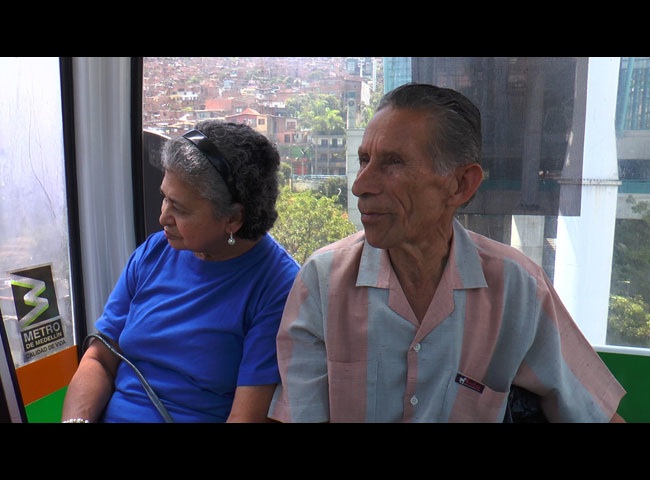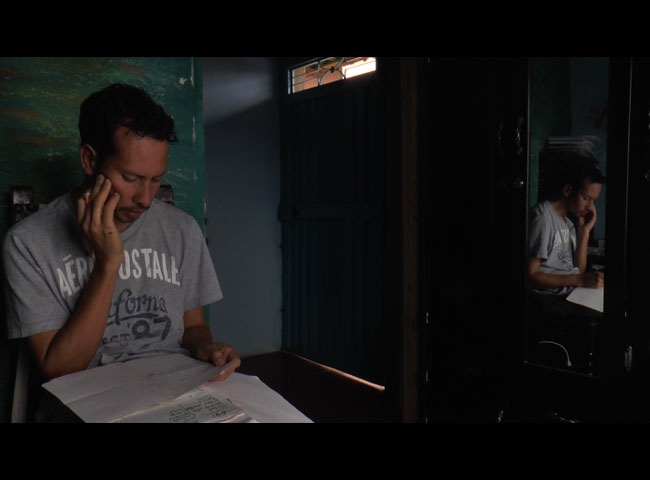La Nouvelle Medellin
-
Réalisé par Catalina Villar • Écrit par Catalina Villar
-
France • 2016 • 85 minutes • Couleur
- Réalisation :
Catalina Villar - Écriture :
Catalina Villar - Image :
Yves de Peretti - Son :
Cesar Salazar, Miller Castro, Nathalie Vidal - Montage :
Gilles Volta
- Production (structure) :
TS Productions - Participation :
CNC. Aide au développement, CNC. Aide au développement renforcé - Ayant droit :
TS Productions
- N° ISAN :
non renseigné
Résumé
Juan Carlos et son ami Manuel étaient adolescents quand je les ai filmés il y a 18 ans à Medellin, la ville la plus violente du monde à l’époque. Juan Carlos le poète a été tué peu après. À l’aube d’une paix fragile, ses parents analphabètes cherchent à obtenir réparation. Devenu leader de son quartier, Manuel s’affronte aux paradoxes de l’innovation urbaine dans une ville qui s’est métamorphosée trop vite. Le fantôme de Juan Carlos se dresse en rempart contre l’oubli.
"En 1997, Catalina Villar filmait les adolescents d’un quartier populaire de Medellín, alors "ville la plus dangereuse du monde". Le poète du groupe, Juan Carlos, y était tué trois ans plus tard. Comme l’annonce le titre de ce film-ci, la ville a changé. Mieux : elle se pose en modèle d’innovation urbanistique. Qu’il grimpe sans relâche les escaliers ou qu’il emprunte le "métrocâble", occasion de beaux travellings en plongée, Manuel, l’un des adolescents de 1997 devenu président de son comité de quartier, imprime au film son activisme arpenteur. Mais le montage alterne ce fil suractif avec l’évocation de Juan Carlos, à travers des citations de ses poèmes et le marathon bureaucratique de ses parents pour obtenir réparation de son meurtre. "Cette nuit, tout s’écrit à l’encre de sang… ", notait le poète : sous la nouvelle Medellín, avec ses télécabines immaculées, Catalina Villar fait affleurer la violence passée. Les peintres d’une fresque murale se demandent comment suggérer la présence symbolique des armes sans pour autant les peindre. Séquence forte du film, la rencontre avec le maire pointe le fossé entre l’image extérieure d’une Medellín high tech et le travail de terrain à accomplir afin que la Bibliothèque España, énorme bâtiment en surplomb récent mais déjà en ruines, ne devienne pas la métaphore de l’échec du progrès. Déjà un voile noir la recouvre, deuil d’une utopie urbaine…"
(Charlotte Garson - Cinéma du réel)
"In 1997, Catalina Villar filmed teenagers in a working-class district in Medellín, at the time “the most dangerous city in the world”. The group’s poet, Juan Carlos, was killed there three years later. As the title of this latest film announces, the city has changed. More to the point: it has been set up as a model of urban innovation. Whether climbing up and down endless steps or taking the “metrocable” – which gives some splendid high-angle tracking shots – Manuel, one of the 1997 teenagers and now president of his neighbourhood committee, leaves the imprint of his street-trekking activism on the film. However, the editing alternates this hyperactive thread with memories of Juan Carlos, introducing quotes from his poems and scenes of his parents’ red-tape marathon to obtain redress for his murder. “This night, all is written in the ink of blood…” wrote the poet. Catalina Villar brings the district’s past violence back to the surface of this new Medellín, with its immaculate egg-shaped cable cars. The mural painters wonder how they can suggest the symbolic presence of weapons without explicitly showing them. In one powerful sequence, a meeting with the mayor highlights the divide separating the external image of a hi-tech Medellín and the ground works that need carrying out to prevent the huge and recently built España library, which towers over the hillside but is already in ruins, from becoming a metaphor of the failure of progress. It is already shrouded in a black veil, in mourning for an urban utopia…"
(Charlotte Garson - Cinéma du réel)
Mot(s)-clé(s) thématique(s)
Sélections et distinctions
- 2016 • Images en bibliothèques • Paris (France) • Film soutenu par la Commission nationale de sélection des médiathèques
- 2016 • Cinéma du réel • Paris (France) • Compétition française
Comment avoir accès au film ?




